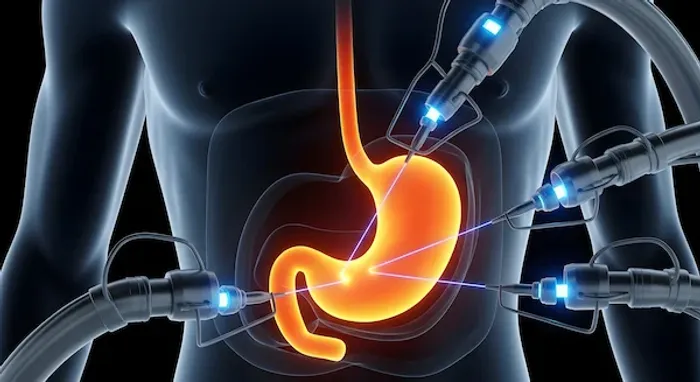A Comprehensive Guide to Obesity and Bariatric Surgery
Know about obesity and bariatric surgery, causes, requirements of surgery, types of bariatric procedures, journey from start to recovery, potential risks and benefits.

Written by Dr. Shaik Abdul Kalam
Reviewed by Dr. Dhankecha Mayank Dineshbhai MBBS
Last updated on 13th Jan, 2026

Introduction
Obesity is a complex and chronic disease affecting millions worldwide, characterised by an excessive amount of body fat that poses a significant health risk. It's far more than a cosmetic concern; it's a medical condition that increases the likelihood of other diseases and health problems, such as heart disease, diabetes, high blood pressure, and certain cancers. For many individuals struggling with severe obesity, where diet and exercise have not yielded sustainable results, bariatric surgery emerges as a powerful and scientifically proven treatment option. This guide aims to demystify obesity and bariatric surgery, providing a clear, step-by-step overview of what the journey entails. Our goal is to equip you with the knowledge needed to have an informed conversation with your healthcare provider about whether bariatric surgery could be the right path for you toward improved health and well-being.
Understanding Obesity: More Than Just Weight
Obesity is often misunderstood as a simple lack of willpower. In reality, it's a multifaceted disease influenced by genetics, physiology, environment, and psychology. The World Health Organisation (WHO) defines it based on Body Mass Index (BMI), but this is just a starting point for diagnosis.
Defining Obesity: The Role of BMI
BMI is a tool that calculates body fat based on height and weight. The classifications are:
Normal weight: BMI 18.5–24.9
Overweight: BMI 25–29.9
Obesity Class I: BMI 30–34.9
Obesity Class II: BMI 35–39.9
Obesity Class III (Severe or Morbid Obesity): BMI 40 or higher
While BMI is a useful screening tool, it doesn't account for muscle mass, bone density, or fat distribution. Therefore, a healthcare professional will use it in conjunction with other assessments.
Consult a Top General Practitioner for Personalised Advice
Root Causes: Why Obesity is a Complex Disease
The causes extend far beyond "calories in, calories out." Key factors include:
Genetics: Your genes can affect how your body stores fat and regulates appetite.
Hormones: Hormones like leptin and ghrelin, which control hunger and satiety, can be dysregulated in individuals with obesity.
Metabolism: Each person's basal metabolic rate (the energy burned at rest) is different.
Socioeconomic Factors: Access to healthy food and safe places for physical activity is not equal for everyone.
Psychological Factors: Stress, anxiety, depression, and past trauma can lead to emotional eating.
Understanding this complexity is the first step in treating obesity with the seriousness it deserves. If you are struggling to manage your weight despite your efforts, consulting a doctor online with Apollo24|7 can help you understand the underlying factors specific to you.
What is Bariatric Surgery? An Overview
Bariatric surgery, commonly known as weight loss surgery, encompasses a variety of procedures performed on the stomach and/or intestines to help a person lose weight. It is considered the most effective long-term treatment for severe obesity, leading to significant weight loss and, often, the remission of obesity-related conditions.
How Weight Loss Surgery Works: Restriction vs. Malabsorption
These procedures work through one or both of two primary mechanisms:
1. Restriction: Physically limiting the amount of food the stomach can hold, which reduces calorie intake (e.g., Gastric Sleeve, Gastric Band).
2. Malabsorption: Surgically altering the digestive tract to shorten or bypass a portion of the small intestine, reducing the absorption of calories and nutrients (e.g., Gastric Bypass, Duodenal Switch).
Many modern procedures, like the gastric bypass, also cause favourable changes in gut hormones that reduce hunger, increase satiety, and improve the body's ability to regulate blood sugar, making them effective metabolic surgery for conditions like type 2 diabetes.
Are You a Candidate for Bariatric Surgery?
Not everyone with obesity is a candidate for surgery. Strict criteria are in place to ensure the procedure's benefits outweigh its risks.
Standard Eligibility Criteria (BMI and Comorbidities)
Generally, you may be a candidate if you have:
A BMI of 40 or higher (morbid obesity), or
A BMI of 35 or higher and at least one serious obesity-related comorbidity, such as:
* Type 2 Diabetes
* Severe Sleep Apnea
* Hypertension (High Blood Pressure)
* Heart Disease
A history of unsuccessful attempts at non-surgical weight loss methods.
The Importance of Psychological Readiness
Equally important is your psychological preparedness. Candidates must:
Understand the procedure and its lifelong implications.
Be committed to permanent lifestyle changes, including diet and exercise.
Have realistic expectations about the results.
Undergo a psychological evaluation to identify any untreated issues like depression or eating disorders that could hinder success.
Types of Bariatric Surgery Procedures
Several types of bariatric surgery are available, each with its own profile of benefits and risks. The most common are performed laparoscopically (minimally invasive).
Gastric Sleeve (Sleeve Gastrectomy)
This is the most popular procedure worldwide. Approximately 80% of the stomach is surgically removed, leaving a banana-shaped "sleeve." It works primarily through restriction and by reducing the production of the hunger hormone ghrelin. It is less complex than a bypass but is irreversible.
Gastric Bypass (Roux-en-Y)
Considered the "gold standard," this procedure involves creating a small stomach pouch and connecting it directly to the small intestine, bypassing most of the stomach and the first part of the intestine. It combines restriction and malabsorption and has powerful metabolic effects, particularly for diabetes.
Adjustable Gastric Band (Lap-Band)
A silicone band is placed around the upper part of the stomach, creating a small pouch. The band's tightness can be adjusted with saline injections. It is purely restrictive and reversible but has fallen out of favour due to lower long-term success rates and potential complications.
Duodenal Switch (Biliopancreatic Diversion)
This is a more complex procedure that involves a sleeve gastrectomy and a significant intestinal bypass. It results in the most weight loss but has the highest risk of nutritional deficiencies and requires strict lifelong supplementation.
The Bariatric Surgery Journey: From Consultation to Recovery
Undergoing bariatric surgery is a marathon, not a sprint. It involves a dedicated process before and after the actual operation.
The Pre-Op Phase: Tests, Diet, and Preparation
This phase is critical for success. You will undergo a series of tests (blood work, heart and lung exams) and consultations with a multidisciplinary team, including a surgeon, dietitian, and psychologist. A common requirement is a pre-operative liver-shrinking diet, typically low in calories and carbohydrates, to reduce liver size and make the surgery safer.
What to Expect During Surgery and Hospital Stay
The surgery itself is performed under general anaesthesia and typically takes 1-2 hours. Most patients stay in the hospital for 1-2 nights. Pain is managed effectively with medication, and you will be encouraged to walk shortly after surgery to aid recovery.
The Recovery Timeline and Post-Op Diet Stages
Recovery involves a structured dietary progression:
Stage 1 (Weeks 1-2): Clear liquids, then full liquids.
Stage 2 (Weeks 3-4): Pureed foods.
Stage 3 (Weeks 5-6): Soft foods.
Stage 4 (Week 7+): Gradual introduction to solid foods.
Adherence to this plan is crucial for healing and preventing complications. Apollo24|7 offers convenient home collection for tests like vitamin D or HbA1c, which are important for monitoring your nutritional status during this phase.
Life After Bariatric Surgery: Long-Term Success
The surgery is a tool, not a cure. Long-term success depends entirely on your commitment to a new lifestyle.
Navigating Dietary Changes and Nutritional Needs
You will need to eat small, protein-first meals, chew thoroughly, and avoid drinking fluids with meals. Lifelong daily vitamin and mineral supplementation (multivitamin, calcium, iron, B12) is mandatory to prevent deficiencies.
The Role of Exercise and Lifestyle Modification
Regular physical activity is essential for maintaining weight loss and overall health. Starting with walking and gradually incorporating strength training helps preserve muscle mass as you lose fat.
Managing Expectations: Weight Loss and Health Improvements
Most weight loss occurs in the first 12-18 months. Patients can expect to lose 60-80% of their excess body weight. The most profound benefit is often the improvement in quality of life, mobility, and the reduction or elimination of medications for comorbidities.
Weighing the Pros and Cons: Benefits and Risks
Like any major surgery, it's vital to understand both the potential rewards and the risks.
Significant Health Benefits Beyond Weight Loss
Resolution or improvement of type 2 diabetes in most patients.
Improved cardiovascular health.
Relief from sleep apnea and joint pain.
Increased fertility and hormonal balance.
Significant enhancement in quality of life and longevity.
Potential Short-Term and Long-Term Risks
Short-term: Standard surgical risks like infection, bleeding, blood clots, and adverse reactions to anaesthesia.
Long-term: Dumping syndrome (especially with bypass), nutritional deficiencies, hernia, gallstones, and the possibility of requiring revision surgery. The risk of complications is generally low when performed by an experienced surgeon.
Conclusion
Deciding to explore bariatric surgery is a significant and courageous step toward reclaiming your health. It is a journey that demands commitment, but for the right candidate, the rewards can be life-changing. The path involves thorough education, careful preparation, and a dedicated support system. If you have been struggling with severe obesity and its related health challenges, this guide serves as a starting point. The most important next step is to seek information from qualified medical professionals. If you are considering whether this path is right for you, consulting a bariatric surgeon or specialist with Apollo24|7 can provide personalised advice and help you understand your options. Remember, investing in your health is the most valuable decision you can make.
Consult a Top General Practitioner for Personalised Advice
Consult a Top General Practitioner for Personalised Advice

Dr Suseela
General Physician
5 Years • MBBS
Bengaluru
Apollo Medical Center, Marathahalli, Bengaluru

Dr. Mainak Baksi
General Practitioner
13 Years • MBBS , MD (MPH)
Howrah
Mainak Baksi Clinic, Howrah
(50+ Patients)

Dr. Jawwad Mohammed Kaleem
General Practitioner
4 Years • MBBS
Hyderabad
Apollo 24|7 Clinic, Hyderabad

Dr. Shaik Abdul Kalam
General Practitioner
3 Years • MD (Physician)
Visakhapatnam
Apollo 24|7 Clinic - Andhra Pradesh, Visakhapatnam
(175+ Patients)

Dr. Rohinipriyanka Reddy
General Practitioner
9 Years • MBBS
Hyderabad
Apollo 24|7 Clinic, Hyderabad
More articles from Weight Loss
Frequently Asked Questions
1. Is bariatric surgery covered by insurance?
Many insurance plans do cover bariatric surgery if you meet specific criteria (BMI and comorbidities). However, coverage varies widely. It's essential to contact your insurance provider directly to understand your plan's requirements and get pre-authorization.
2. How much weight will I lose, and will I gain it back?
On average, patients lose 60-80% of their excess body weight. The highest rate of loss is in the first year. Long-term maintenance is possible but requires adhering to dietary and exercise guidelines. Some regain is common, but significant regain is often linked to not following the recommended lifestyle.
3. Will I have loose skin after major weight loss?
Most patients will have some degree of loose or hanging skin, which depends on factors like age, genetics, total weight lost, and skin elasticity. Exercise can help tone underlying muscle, but surgical body contouring may be an option for significant skin excess once your weight has stabilised.
4. Can I get pregnant after bariatric surgery?
Yes, in fact, fertility often improves. However, it is strongly recommended to wait 12-18 months after surgery before becoming pregnant, as this is the period of most rapid weight loss and nutritional adjustment. Pregnancy after surgery requires careful monitoring by your OB-GYN and a bariatric dietitian.
5. What is the difference between the gastric sleeve and gastric bypass?
The gastric sleeve is a simpler procedure that reduces stomach size. The gastric bypass is more complex, creating a small stomach pouch and rerouting the intestines, which has a stronger effect on metabolism and diabetes. Your surgeon will recommend the best procedure based on your health profile and goals.




